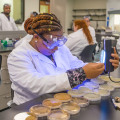Are you considering a career in food science? It's an exciting field with many opportunities, but it also has its drawbacks. In this article, we'll explore the pros and cons of being a food scientist and technologist, so you can decide if it's the right career for you. Food scientists and technologists are responsible for developing new food products, improving existing products, and ensuring that food is safe to eat. They use their knowledge of chemistry, biology, and other sciences to create new recipes and processes for food production.
One of the advantages of being a food scientist is that you get to work with a variety of ingredients and create new products. You'll also have the opportunity to work with cutting-edge technology and develop innovative solutions to food-related problems. However, there are some drawbacks to being a food scientist. For one, you'll need to have a higher-level degree, such as a doctorate, in order to work in research or as a food chemist.
This means that seven or more years of education in a food science major may be required before you can start working. In addition, many of the jobs in the field require long hours and can be physically demanding. You may also find yourself working with ingredients that you don't like or that are impossible to work with. Finally, since much of the work is done in secret, you won't have any textbooks or other resources to help you learn the trade.
Another disadvantage is that the field is relatively small and competitive. There are only a few universities offering degrees in food science, so there may be fewer job opportunities than in other industries. In addition, many of the jobs require specialized knowledge and skills that not everyone has. On the other hand, there are some advantages to being a food scientist.
For one, there are some exciting trends in the industry right now, such as the shift to locally grown ingredients and the emergence of professional food collectors who source ingredients for restaurants from farmers' markets and other local businesses. In addition, many of the jobs in the field require an understanding of several mathematical and scientific concepts, such as organic chemistry and biology. This means that if you have an aptitude for these subjects, you may be able to find a job in the field more easily than someone without this knowledge. Finally, if you're interested in making a difference in people's lives through your work, then being a food scientist may be a great choice for you.
People like Louis Pasteur have made great advances in medicine and food through their work as food scientists and technologists.







Leave a Comment